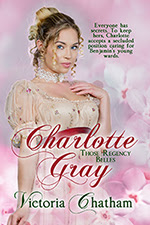Details and Purchase links
https://bookswelove.net/chatham-victoria/
Charlotte Gray discovers her home ransacked,
her father missing, and a dark and dangerous stranger, Benjamin Abernathy,
waiting for her. He had promised to take care of his friend’s daughter if
anything befell him and must now follow through with that promise.
With no other options, and despite her
misgivings, Charlotte becomes established in the stranger’s home as governess
to his nephew and niece. Benjamin doubts her ability to cope with the two young hellions but is
quickly reassured as he recognizes the sharp mind behind her blue eyes. But is
it Charlotte’s mind he falls in love with, or her delectable body?
With Charlotte hunted for the knowledge she is
suspected of possessing and Benjamin, for the threat he presents, danger stalks
them. Will the smugglers and spies behind the threat
have any chance against this duo who will go to any lengths to protect the
secrets they each must keep?
* * *
I don't pretend to write complex novels. My stories have, I hope, an easily understood point to make to the reader.
Writers, especially new writers, frequently worry about how much of themselves they reveal in their writing. Therefore, it follows that writing subtle or intuitive themes would suggest the author has those qualities and is writing from their own point of view or at the very least understands them well enough to introduce them in their writing.
My characters may already be married, as Lord and Lady Buxton in The Buxton Chronicles or become married, and love, loyalty, and fidelity lie at the heart of all my novels.
During the Regency era in which I set most of my novels, women were expected to get married and expected it of themselves with few exceptions. Jane Austen is one of them. Aristocratic families married not so much for love as economics. How does one enlarge one’s estate and holdings? Marry the heir or heiress next door. While that might sound cold, it was just the way of things amongst the upper class.
Once an heir arrived to complete the happy or
not union, the lord was free to take a mistress (if he ever gave one up.) His
lady, discreetly, of course, might take lovers while everyone turned a blind
eye to their extra-marital shenanigans. Or, as in the case of Georgiana,
Duchess of Devonshire who, later in her marriage to the emotionally distant
Duke, was forced to accept his mistress Lady Elizabeth Foster into a ménage à
trois which delighted the gossip-mongers of the day.
Victoria Chatham











Different cultures at different times and places dealt differently with marriage, and more often than not, love wasn't a concern. In Paris in the same period, an average "honest woman" would have "one husband and three lovers." More than three lovers would encourage gossip.
ReplyDeleteThree lovers? How energetic! Thanks for dropping in Vijaya.
DeleteLove reading Regency books. Only attempted to write one but I tend to have complicated plots. Can't wait to read your next
ReplyDeleteHope you enjoy it, Janet.
ReplyDelete